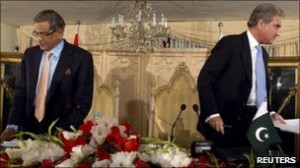 India and Pakistan held another round of diplomatic exchanges last week when India’s Foreign Minister S.M. Krishna visited Pakistan and held meetings with his Pakistani counterpart, Makhdoom Shah Mahmood Qureshi. The bilateral talks were a continuation of the recently resumed dialogue process between the two countries. The meeting was not expected to throw up any surprises as the agenda was limited to delineating the future course of negotiations. Diplomatically the meeting was not a failure as both countries reaffirmed the desire to continue talking. In an environment of strained relations, meeting between state dignitaries serve as confidence building measures allowing parties to move towards negotiations. Measured by this standard, the Krishna-Qureshi dialogue last week cannot be termed successful. The trust deficit stands augmented and the Foreign Ministers are not expected to meet at the sidelines of the on-going Kabul Conference.
India and Pakistan held another round of diplomatic exchanges last week when India’s Foreign Minister S.M. Krishna visited Pakistan and held meetings with his Pakistani counterpart, Makhdoom Shah Mahmood Qureshi. The bilateral talks were a continuation of the recently resumed dialogue process between the two countries. The meeting was not expected to throw up any surprises as the agenda was limited to delineating the future course of negotiations. Diplomatically the meeting was not a failure as both countries reaffirmed the desire to continue talking. In an environment of strained relations, meeting between state dignitaries serve as confidence building measures allowing parties to move towards negotiations. Measured by this standard, the Krishna-Qureshi dialogue last week cannot be termed successful. The trust deficit stands augmented and the Foreign Ministers are not expected to meet at the sidelines of the on-going Kabul Conference.
On the eve of talks, India’s Home Secretary G.K. Pillai, stated in an interview that the real sense India got from interrogating David Headley was of the “significant role that the ISI played (in the 26/11 attacks). It was not just a peripheral role; they were literally controlling and coordinating it from the beginning to the end.” Though India has earlier expressed concern on Pakistan’s involvement in the 26/11 Mumbai attacks, this was the first public statement of implicating the ISI’s direct role. Questions have been raised on the timing of G.K. Pillai’s candid disclosure to the media.
It would be unfair to hold Pillai’s statement as the sole reason for the aggressiveness and acrimony displayed by both sides immediately after the two dignitaries met. Hostility between India and Pakistan has been on auto-pilot since 1947; in the absence of Pillai’s statement the outcome of the meetings would not have resulted in a dramatic breakthrough. The post-dialogue press conference, which was delayed for about eight hours, indicated that the India and Pakistani sides were completely out of sync.
Pakistan’s Foreign Minister Qureshi minced no words in saying that “When you point out to Saeed’s speech, or speeches, let me draw your attention to the Indian Home Secretary’s (G.K. Pillai) statement. The dialogue which was reported in all Pakistani papers. Tell me, to what extent it has helped? We were of the opinion that it was uncalled for.” Later, Minister Qureshi also questioned India’s approach to the dialogue process citing Minister Krishna continuous interaction with New Delhi during the meeting as an irritant for smooth discussions. India, in the view of the Pakistani Minister, was not fully prepared for the meeting.
India’s Foreign Minister, while refusing to be drawn in a verbal duel, has countered Foreign Minister Qureshi’s frivolous charges.
In the midst of highly charged exchanges the primary agenda of the talks, charting the future course of actions, remains unaddressed. While Pakistan wants all outstanding issues, ranging from Siachen to terrorism, addressed in a time-bound manner, India feels the terror issue must first be firmly addressed before comprehensive dialogue is resumed.
As long as India and Pakistan approach the dialogue process with the objective of discussion dominance rather than resolution of differences, future bilateral meeting may prove futile.